- Featured
- Clean air
- Climate justice
- Consumer Rights
- Corporate Accountability
- Data access
- Early Childhood Development
- Economic fairness
- Education
- Electoral fairness
- Environmental justice
- Food justice
- Gender based violence
- Grants/social assistance
- Health
- Housing and infrastructure
- Industry interference
- Land Justice
- LGBTQIA+ rights
- Media/ information access
- Public transport
- Racism
- Reparations
- Safety
- Sanitation
- Service Delivery
- Sexual and Reproductive Rights
- Social justice
- Unemployment
- Womxn's rights/ gender equality
- Workers' rights
- More
-
Minister of Labour wants to change the law so domestic workers can get compensation - support thisDomestic workers are denied compensation for injuries because they are excluded from the Compensation for Occupational Injuries and Diseases Act (COIDA). But an amendment to the law has been proposed. But we only have 7 days before public submissions close, and we need to come together in numbers to ensure the law is changed. Maria Mahlangu, a domestic worker drowned in 2012. Her family was offered only R2500 compensation. Johanna Motha was bitten by her employer's dog and set home without medical treatment. She ended up dying as a result of her injuries. These are just two of the countless incidences of injury and illness domestic workers have faced on the job. SADSAWU( South African Domestic Service and Allied Workers Union) brought an application against the Minister of Labour and the Compensation Commissioner for domestic workers to claim compensation in terms of the Compensation for Injuries and Diseases Act 130 of 1993(COIDA), in response to the poor compensation Mahlangu's family was offered. The case has been pending since 2015. The case has recently been postponed, after being set for the 15th of October. This case is an example of the consequences of domestic worker's exclusion in this Act. We call on you to recognize this case, as well as the rights of domestic workers. The reality is that domestic work opens itself up to abuse. This abuse is targeted at Black working class womxn, who work behind closed doors and make up the largest percentage of domestic workers. Issues like health are always linked to racism and classism. Domestic workers are not seen as equals to their employer and are treated with contempt and disrespect. In the past domestic work, was not regulated by government, because they were not part of key labour legislation. Their work, was therefore seen as casual and informal, and little respect was paid to the work they do. This attitude of disregard towards domestic workers, is still seen in the way employers treat domestic workers. We are not paying enough attention to the health of domestic workers. Even though domestic work is included in the Occupational Health and Safety Act, they are still not a part of the Compensation for Occupational Injuries and Diseases Act [1]. This means domestic workers cannot seek medical compensation for costs linked to work related injuries and diseases. Domestic workers have to cover their own medical expenses when injured on the job. This is often times impossible- due to the small sum of money they are paid. Domestic workers should be paid R1787.80 a month [2], this is hardly enough to cover basic living expenses and transport to work. A study by Dr. Lindiwe Innocentia Zungu on the health conditions domestic workers experience. The findings were that there are a range of workplace health hazards. These included “chemical hazards due to detergents and other chemicals used for cleaning purposes, and physical hazards from activities involving manual handling and/or repetitive movements, e.g. scrubbing floors, moving furniture, washing and ironing clothes.... Furthermore, psycho-social hazards due to urbanization were also prevalent among participants who resided in their employers’ premises.'' [3] It is clear that domestic work can be dangerous, physically and mentally. This is why it is important that we demand for the Minister of Labour to commit to including domestic workers in the Compensation for Occupational Injuries and Diseases Act. By including domestic workers in this Act, they will have access to health care, when faced with injury or illness acquired on the job. Their inclusion in this Act is also a message of recognition for the important work they do. By getting enough signatures on this petition, together we can demand the Minister of Labour to commit to making domestic work a priority and include them in the Compensation for Occupational Injuries and Diseases Act. [1] “The 2018 minimum wages for nannies and domestic workers.” Nic Anderson. 13 December 2017 for Parent24 [2]“Bill on labour brokers gets green light”Nov 12 2013 Sapa. Fin24 [3]"Employment conditions and challenges associated with being a domestic worker in KwaZulu-Natal, South Africa. "Dr Lindiwe Innocentia Zungu, Associate Professor, University of Johannesburg, Faculty of Health Sciences.1,683 of 2,000 SignaturesCreated by Clio Koopman
-
Stop all farm evictions1. Over 20 000 people are threatened by farm evictions in the Western Cape, Tshintsha Amakhaya is calling on president Cyril Ramaphosa to keep his promise following an announcement he made in Paarl in 2014 that there will be a moratorium as an immediate ban on legal and illegal farm evictions. Following the massive farm workers strike in De Doorns, Ramaphosa said, “We are calling on all farmers who have plans for evictions to stop the evictions.” However, the moratorium never came to effect. Instead, instances of farm evictions and human rights violations on farms persist. Today, Drakenstein Municipality has about 1,127 pending eviction matters. 2. The thousands of illegal evictions of farm workers and other farm dwellers continue to be evicted across the country despite the clear protections contained in the Extension of Security of Tenure Act 62 of 1997 (‘ESTA’) that a farm worker and persons living in the same dwelling as the worker may only be evicted: a) in terms of an order of the court b) once the court is satisfied that the eviction would be just and equitable c) and once the Land Claims Court has confirmed the order; 3. The great hardship, conflict and social instability caused by such evictions on a group of people already rendered vulnerable through their insecure tenure. 4. The disproportionate impact of these illegal evictions on women due to the commercial agricultural system that continues to confine women to an auxiliary labour category increasing their vulnerability to labour-related evictions. 5.The total system failure to protect the rights and security of farm workers and dwellers due to poor enforcement and resource endowment of ESTA; 6. The continued failure of municipalities to provide adequate alternative shelter as legislatively prescribed. 7. The Constitutional imperative, in section 25(6), to ensure that person whose tenure of land is legally insecure as a result of past racially discriminatory laws or practices, like farm workers and other farm dwellers, are provided with either legally secure tenure or comparable redress. Both farm workers and dwellers should be prioritised and be at the forefront of cases on which expropriation without compensation will be tested. “We used to work hard on this farm until we were retrenched in 1999. Nothing happened on the farm for 11 years and most of us couldn’t find work again. Now this farmer wants to evict us” This a desperate cry by a mother whose family is facing eviction from the farm she's worked and lived in for years [1]. She, like many others, now face a bleak future of being dumped on the road side with no protection and nowhere to go. President Cyril Ramaphosa made a promise in 2014 to stop farm evictions until people can be given dignified housing [2]. Even more recently, Deputy Minister Mcebisi Sikwatsha has seen with his own eyes the desperate situation farm workers are faced with [3] and also made promises to take it up with his Minister and President. We however cannot leave it to them. Thousands of illegal evictions of farm workers and other farm dwellers continue to be evicted across the country despite the clear protections contained in the Extension of Security of Tenure Act (ESTA). Places like Drakenstein are eviction hotspots with 1,127 pending evictions matters [4]. Evictions bring great hardship, conflict and social instability. The failure to protect the rights and security of farm workers and dwellers due to poor enforcement of ESTA and the failure of municipalities to provide adequate alternative shelter as legislatively prescribed need to be addressed. We need to stand with those being evicted and demand that government responds to the cries of the people. Will you tell President Cyril Ramaphosa and Minister Maite Nkoana-Mashabane to stop all farm evictions and help protect the rights and security of farm workers and dwellers? [1] [3] Western Cape could be testing ground for land expropriation without compensation, says minister, Barbara Maregele for Groundup News. 5 June 2018. [2] Ramaphosa asked to keep his promise to freeze farm evictions, Barbara Maregele for Groundup News. 5 April 2018. [4] Woman faces eviction after 51 years on a farm, Barbara Maregele for Groundup News. 31 May 2018.426 of 500 SignaturesCreated by Tshintsha Amakhaya

-
Stop taxing my periodThousands of amandla. mobi members have fought hard to make free sanitary products a reality for millions of girls. Unfortunately, for the households that could put a few rands together to buy a pack, the VAT hike announced earlier this year has made it even more expensive, meaning more people who need sanitary towels could go without. But right now, we have an opportunity to change that. Public submissions to the expert panel investigating the expansion of zero rating to more items was extended. But it ends on June 4, 2018. Send the panel a direct message telling them to recommend that sanitary products are included in the list of essential zero-rated products. People who get periods will buy up to 17 000 sanitary pads or tampons in their lifetime [1]. This basically means that the average person could spend up to almost R40 000 on sanitary pads in that time [2]. This in a country in which over 50% of the population live in poverty. The VAT hike has had an impact on the cost of living in Mzansi. People are spending much more on essential food items, reducing how much they have for other needs. And living a decent, dignified life requires so much more than food. Our community exists to primarily protect us, Black women. You, and over two hundred thousand others have taken action to make this real. And we need you to once again stand with us and make sure the panel recommends dropping the tax on our periods. [1] A guide to 'alternative menstruation': Save money and the world during your period, Pontsho Pilane for Bhekisisa. 31 Oct 2016. [2] Why treasury won't support a fall in the tampon tax, Pontsho Pilane for Bhekisisa. 5 Dec 2016.680 of 800 SignaturesCreated by Amandla.mobi Member
-
Tell UNISA to include Black women on land expropriation discussionWomen in South Africa are more than 50%of the population. The issue of land is important to us as citizens with full rights in this country. Women are also thinkers, opinion leaders and represent an important an essential voice in the discourse about land in this country. It is therefore unfathomable that the panel UNISA has constituted to discuss this issue is male, with one woman panelist. It undermines the views of women in decision-making and excludes a large constituency from a critical debate in the country, consequently treating them as 2nd class citizens. We implore you to desist from this form of secondary Apartheid and victimisation of women. We are equal citizens and our input is not only important but necessary.36 of 100 SignaturesCreated by Lebogang Ramafoko
-
Tell the City of Cape Town that we reject the budget and privatization of waterCape Town is being used as an international social experiment. Yes there is a drought but 'day zero' is a deliberate lie to justify the rapid privatization of water. The City used a formula that assumed it would not rain; it assumed that it would be windy and hot every day; they failed to consider that large agriculture was abusing water; day zero was flawed from the beginning. Now the international banks are using Cape Town to threaten other cities in SA and the rest of the world, to privatize water. That is why we need to join hands to stop the privatization of water in Cape Town * over 260 000 families (almost half of Cape Town) has already had water management devices forced onto us. * these limit the amount of water that households can use per day * the city aims to change to pre-paid water; in other words, no money, no water; they have already introduced this in parts of Grabouw *currently the real cost of water provision is R6 per kl; the City has increased this by 500% and want to increase it by a further 27-87 %. They want to charge high tariffs for water so the large banks can make pots of money. *the City wants to borrow from international banks for large scale projects such as desalination; the major part of the water budget will go to desalination, about R7.4 bn. In other words, the international banks will make profits out of water. Desalination puts our water into private hands, for profits; desalinated water has caused the death rate from heart attacks to double; it also makes fruit less nutritious. * just as the national govt increased electricity prices by 20% per year, the City wants to do the same with water. * many of the water management devices (over 16%) are defective; they are leaking and shut off, leaving thousands without water for basic needs; * many are getting huge bills of thousands and sometimes hundreds of thousands of Rands. *pressure is reduced in the pipes during the times that people need water; thousands are without water. *the City and other levels of govt knew more than 10 years ago they had to adopt water saving measures such as using recycled water for sanitation; they knew they had to recycle water for recharging aquifers; they knew they had to fix the infrastructure (the City loses 100 million litres per day through leaks). They failed. If we do not stop the privatization of water, the same high tariffs and poisonous desalination will be forced on more communities in SA and around the globe. The next generations will be paying huge tariffs for water. If you have no money, you will have no water. People will die as a result. The City must be stopped. The Water Crisis Coalition is marching to the City and to parliament on the 25th April 2018 at 10am from Keizergracht , at the end of Darling Street, opposite the castle. We want to hand over all signatures and petitions. We invite you to print copies of our petition and to bring them along on the day. Copies can be obtained via [email protected] Some useful references: Proof that Day zero formula was fake: https://drive.google.com/file/d/0B2Fo95AHFCN2bGdGWU1uajRHcDMxVFZUdFFObFU4djhuWFg0/view?usp=sharing Here is the downloadable leaflet which can be used as a free train ticket on the 25th April 2018, for the march. https://drive.google.com/file/d/0B2Fo95AHFCN2aThmWFRrdHZvYUhCNXp0ejFvX3piNHU3eVRZ/view?usp=sharing Joint Saftu-Water Crisis Coalition memorandum handed to the City on our demands on water 12 April 2018 https://drive.google.com/file/d/1xLVvvmRPzUZKJWFBxwGphhGFItJF6W0-/view?usp=sharing Downloadable petition which we will hand over to the Mayor on the 25th April 2018. Why not sign up your community or workplace? https://drive.google.com/file/d/0B2Fo95AHFCN2VVQ0OWYtSGNIWkNDeXVBWk9lcDk5ZFU5MVU4/view?usp=sharing Thesis on some of the 70 springs around Table Mountain https://etd.uwc.ac.za/bitstream/handle/11394/2686/Wu_MPHIL_2009.pdf?sequence=1&isAllowed=y Now the City wants to reduce the collection points for water at Newlands from 32 to 16. Let us march against this madness. Open the springs now. https://m.facebook.com/groups/320668791777159?view=permalink&id=355469214963783 Call by Reclaim Camissa on the need to preserve our springs http://thegreentimes.co.za/calling-government-conserve-groundwater-springs/ Reclaim Camissa site www.reclaimcamissa.org www.facebook.com/RECLAIMCAMISSA/ http://twitter.com/ReclaimCamissa There are a number of other petitions against the budget. We are not in competition with any of them but wish to bring our perspective forward. If you are not comfortable with signing our petition, here is a site which you can consider: https://www.dearcapetown.co.za/coct-budget/3,441 of 4,000 SignaturesCreated by Water Crisis Coalition
-
Better Care for HIV Positive People and their PartnersMost people living with HIV do not disclose their statuses to their sexual partners due to fear of rejection or gender-based violence. This means that the one with HIV may struggle to adhere to treatment leading to poor compliance or virological failure and the one with unknown status is at risk of HIV in case she or he is HIV negative. On the other hand, reproduction is a human right irrespective of HIV status and serodiscordant partners have no access to a program designed to assist them in safely achieving their reproductive needs. Those who want to conceive, considerations in choosing the optimal method to achieve pregnancy include transmission risk, treatment efficacy, and affordability should be prioritized. Research has proven that HIV-negative partners in serodiscordant couples are at risk of HIV infection if the index partner did not receive any intervention. Due to non-availability of assisted partner notification support for HIV positive people who want to disclose safely to their partners and safer conception services for discordant partners, people tend to keep their HIV statuses to themselves and engage in unprotected sex in order to meet their reproductive need. In 2016, World Health Organization (WHO) released self-testing and Partner notification guidelines which state that Voluntary assisted partner notification services should be offered as part of a comprehensive package of testing and care offered to people with HIV. The same year, South African National Department of Health released Health Sector HIV Prevention Strategy that focused on rendering HIV prevention service to serodiscordant couples among other services but until now, there is no guide on service delivery to HIV positive people and their partners even though the 2017-2022 NSP mentioned the need for Assisted Partner Notification and discordant partner support (including Prep). Serodiscordant couples are listed among vulnerable population on the strategy released in 2016 but other groups like truck drivers, inmates, OVC's, survivors of sexual abuse, Young women, and Girls and migrant population have programs specific for their health needs but no services to support people with HIV people and their partners. The Dukashe Family (in the picture - discordant marriage) is fortunate enough because the couple is in the health field and could afford safer conception service even though the wife struggled to disclose the status for a very long time (as most people with HIV do).158 of 200 SignaturesCreated by Mandisa Dukashe
-
Tell SAFA sponsors to ensure Danny Jordaan is suspended over rape allegationsWomen face huge barriers in pursuing justice for gender-based violence and sexual assault. For too long powerful men have used patriarchy and vast resources at their disposal to maintain a system where it is extremely difficult for women to come forward, and those who do often don’t see justice. Yet, day by day, this system which silences women is being exposed and dismantled. Jennifer Ferguson has already faced challenges coming forward with her experiences of allegedly being raped by Danny Jordaan, including being told by a Police Constable “You can’t report this! Why has it taken so long?” 3. Jennifer Ferguson alleges that when she tried to find justice through mediation outside of court in 2017, Danny Jordaan’s Advocate contacted her child’s father and “...asked if he would be prepared to come forward, off the record, to disclose anything compromising [about] my past” 4. If Danny Jordaan is so innocent, why is SAFA, the organisation he is President of, defending him? Sources [1] http://ewn.co.za/2018/03/29/safa-to-support-danny-jordaan-in-jennifer-ferguson-rape-claim [2] https://www.safa.net/2018/03/29/let-justice-take-course/ [3] https://www.dailymaverick.co.za/article/2018-03-26-jennifer-ferguson-why-ive-laid-a-rape-charge-against-danny-jordaan/#.Wr0Lp5NuY_U [4] https://www.dailymaverick.co.za/article/2017-11-01-op-ed-why-danny-jordaans-response-to-rape-allegations-insults-us-all/#.Wr0LpJNuY_U284 of 300 SignaturesCreated by amandla.mobi member

-
Decriminalise sex work now! Don’t let this moment passSex work is work, and right now sex workers are calling for solidarity to keep them safe by supporting the call for the full decriminalisation of adult sex work. Some in Parliament support this call and if enough of us make public submissions before the 26th February 2018, we could change the lives of sex workers. Like many other people, Nosipho uses her profession to support herself and her family, to further her studies, to save up for her future and to gain financial freedom and security [1]. But because sex work is criminalised in Mzansi, she and many others, face unsafe working conditions where they face corrupt police who want bribes or rape sex workers in exchange for not being arrested. https://www.youtube.com/embed/dg4l3X9rJHw?ecver=1 This video explains the 4 possible legal models for sex work and why South African sex workers want the full decriminalisation of sex work. Despite the overwhelming evidence showing the ongoing harm caused by criminalisation, the much anticipated sex work report by the South African Law Reform Commission (SALRC) recommends that sex work remains a criminal offence [2]. Now, for the first time in decades, there's a real chance for change. Sex workers and women’s rights groups, like SWEAT and Sisonke, have loudly condemned the report. Parliament's Multi-Party Women's Caucus noted the flaws of the report [3] and the chairperson of the Caucus stressing that the full decriminalisation of sex work is the only model that respects the rights of sex workers [4]. In just a few days, the Women’s Caucus could help determine what the future looks like for people like Nosipho. If we don’t speak out against this horrendous report sex workers may be sent back into danger. There’s only a few days left to make submissions responding to the report. Make sure to send yours through by the 26th February 2018. [1], I am a sex worker: criminalising my work puts me in danger, Nosipho Vidima for GroundUp News, June 14, 2017. [2] Parliament's women's caucus to host sex work summit, Jeanette Chabalala for News24. Feb 9, 2018. [3] Sex work report on prostitution rejected, Nicola Daniels for Independent News. May 30, 2017. [4] Multi-Party Women's Caucus disappointed about law reform commission report on adult prostitution, Ms Masefele Story Morutoa. June 1, 2017.1,001 of 2,000 SignaturesCreated by Amandla.mobi Member
-
Stop #RhodesWar on Womxn Activists Now!#RhodesWar has been trending since Monday, 11 December, as the public became aware of two female students banned for life from UCKAR because they participated in anti-rape protests in April 2016. The outrageous treatment of student activists at UCKAR who are being systematically excluded and victimized for bringing attention to the failures of management to address the flagrant rape culture on that campus can not be tolerated. We must make sure that womxn activists are not punished for speaking out, taking action and challenging patriarchy in institutions of higher learning and elsewhere. Further this latest attack on student activists represents a wider trend where student leaders are being pushed out of universities for daring to challenge patriarchy, capitalism and calling for decolonised education. These limits placed on hard-won democratic freedoms like the right to protest must be challenged. We must fight for the students who risk everything to fight for us!1,417 of 2,000 SignaturesCreated by Ferron Pedro
-
Stand up for inclusivity, support Tumi Morake.The comments made by Tumi are her reflection and interpretation of the structural effects of colonialism and apartheid that continue to plague majority of South Africans to this day. As post-apartheid South Africans that are interested in inclusivity and unity, we believe healing will truly happen when we acknowledge past wrongs, own up to the wrongs through restitutive justice, and actively support initiatives that seek to heal and unite us. The current social media onslaught, and the initiatives led by Afriforum and Solidarity to alienate and have Tumi Morake removed from the breakfast show, amongst other things, are not in the spirit of nation building and do not comprehend the spirit under which her comments were made. We petition Jacaranda FM and its shareholders to stand up for the ideals on which the new South Africa is built on which are progressive and inclusive thinking.2,144 of 3,000 SignaturesCreated by Thoba Vokwana
-
Harsh sentence for Sikhangele Mki"The convicted serial rapist carried out a reign of terror in Delft and Khayelitsha. He says his modus operandi would be to follow his victims and grab them and threaten them at knife point. He would hold the knives against their necks and demand money and their cellphones. He says he would take his victims to an isolated place and then rape them. [1]" South Africa is engulfed with incidences of abuse against women and children. While a harsh sentence won't undo the psychological and physical trauma of his crimes, it will surly send a strong message to other perpetrators that such behavior is not welcome. Please join the protest action outside the court on 5 September 2017. [1] Serial rapist pleads guilty to raping minors, Genevieve Serra for Independent News. 18 May 2017.28 of 100 SignaturesCreated by Amandla.mobi Member
-
Dismiss Deputy Minister Mduduzi Manana for assaultSouth Africa is bogged by many incidents of assault against women to an extent that these have been normalised. Many women are killed, raped and brutalised by men on a daily basis, and yet very few are brought to justice for these crimes. Dismissing Deputy Minister Mduduzi Manana will be sending a loud and clear message that we condemn such behaviour. Deputy Minister Manana is a public figure, and as such, should know the high expectations of him. Keeping him in the employ of the government will undermine ongoing efforts to develop and implement a comprehensive, fully funded National Strategic Plan to prevent, combat and respond to GBV. Mduduzi Manana must be dismissed if we want to send a clear message that when you strike a woman you strike a rock. It's also worth noting that the Deputy Minister Mduduzi Manana led dialogues on Gender Based Violence [3]. Action against perpetrators of gender based violence must be swift, we have had enough of hollow words. It's time for action. Some have raised the point that victim of the assault called Mr Mduduzi Manana 'gay'. Such an utterance shows how homophobic Mzansi is, that calling someone gay is seen as derogatory and must be condemned. But equally, Mr Mduduzi Manana to be so offended by being called gay is also deeply problematic. But regardless, violence against women can never be justified. [1] https://www.timeslive.co.za/politics/2017-08-07-i-apologise-unreservedly-for-shameful-incident-at-cubana-mduduzi-manana/ [2] http://www.iol.co.za/news/politics/listen-deputy-minister-mduduzi-manana-confesses-to-slapping-woman-10669559 [3] http://www.dhet.gov.za/SiteAssets/Latest%20News/August%202016/Rhodes%20University080816.pdf2,881 of 3,000 SignaturesCreated by Amandla.mobi Member
.png)
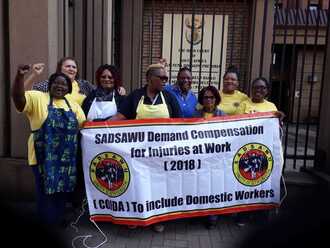
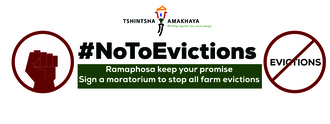

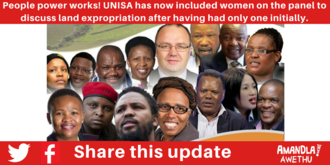.png)
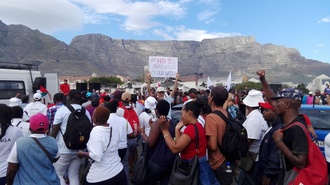
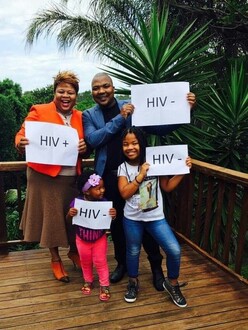
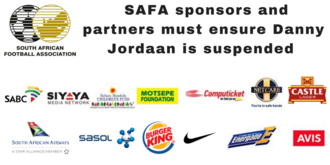.png)
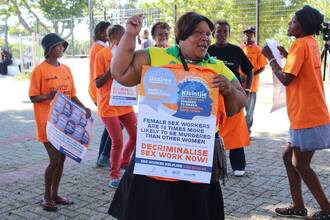


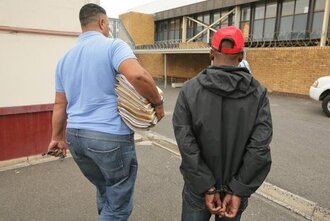
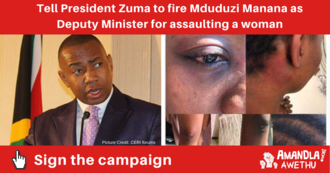.png)